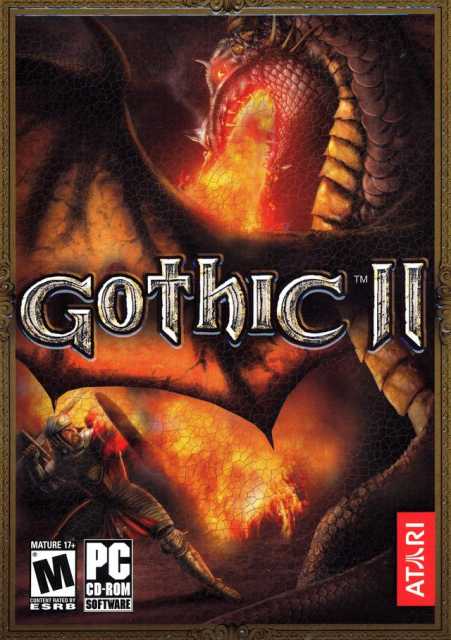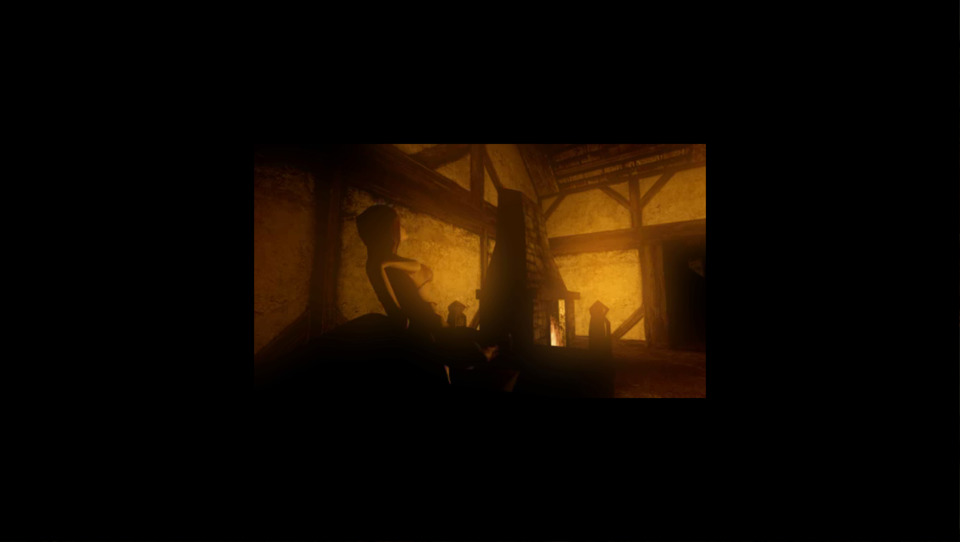
I don't know what it is about these Gothic games I find so compelling. I suspect it's the excellent sense of structure and the character progression's perception of value in spite of or maybe even due to its 2003-era antiquated mechanics and high difficulty level. I've spent the better part of the last week traipsing across Gothic II's island of Khorinis, probing into monster-infested areas to see how far I can make it before something very big with equally large teeth decides to cut my adventure short, while ticking off a series of side-quests and faction quests for the XP, gold, and equipment I need to finally master the game. However, I'm sad to report that I don't think I'm even halfway through the adventure yet. This sequel's considerably larger than its predecessor, which shouldn't surprise me given that the previous game's map fits snugly inside this one's.
When I reviewed Gothic last year, I mentioned that one of its most appealing qualities is its table-setting, and subsequent "pulling off the tablecloth": there are a huge amount of named NPCs in Gothic, many of which reappear in the sequel with lots more new faces besides, and you kind of get used to talking to them, solving their problems, trading or training with them, or simply spotting them as you walk by their semi-fixed locations en route to your next destination. The citizens and militia and paladins and members of the secretive thieves guild of Khorinis City, the mercenaries at Onar's Farm (most of which, like you, are former denizens of the prison colony from Gothic 1), the respective circles of Water Mages and Fire Mages, the patrons of the Dead Harpy Inn (a strategically-placed central location on the island), and the various hunter loners scattered around the map whose campfires make for a comforting point of stark visibility against the dark night where you're more likely to hear a monster approaching (with the concomitant dramatic change in BGM) before you see them. I'm so used to Khorinis and its populace that I could give you a brief description of almost everyone in the game - in the interest of readability and length, I won't actually be doing so - and I'm waiting for a future chapter to introduce a calamity that upends the island's fragile equilibrium and start unceremoniously bumping off half of this cast. That the early game can take you so long, just through exploring the quite substantial surroundings, feels purposefully done so these late-game events can lend more weight. At least, these are my assumptions based on playing through Gothic 1: as I said, even after a week I'm still in the game's halcyon chapters seeing what's out there. Another welcome aspect to this is how characters remember what you've done, either to/for them personally or just general gossip about your exploits, and how they might start treating you differently as the game progresses - an example of this is the way you ingratiate yourself to the "code of the schoolyard" dynamic of the mercenary camp, which is by earning their respect usually by defeating them in non-lethal duels. It's hard to overstate just how important a living, breathing, ever-evolving world - especially one with a strong internal logic to its construction, ecosystem, and economy - is to an open-world RPG, and how difficult it must be to pull off both in a mechanical and narrative sense. It's why Ultima Underworld set a high bar for 3D RPGs right out of the gate with its carefully planned subterranean habitat turned hostile dungeon, and why something as well formed and "lived in" as the titular locale of Obsidian's Fallout: New Vegas is still celebrated a decade later.

The character development is exceedingly stringent, but I've come to appreciate why that is. When you have a character capable of evolving in any direction with any number of talents and abilities to pursue, you need to establish limitations to encourage players to focus on one particular direction for their build: a character should be a deft fighter, or a clever mage, or a resourceful thief, and possibly a weaker combination of two of those, but definitely not all three. Thief skills are relatively cheap in comparison to the heavy investments you must make in the stats and training to effectively swing a sword or a fireball, and you still have to decide on a strength or dexterity focus (there are melee and ranged options for both, fortunately). It's easy to get sidelined by what seem like worthy investments, like removing parts from animals to get more items to sell or learning to brew a host of different potions with the game's alchemy system, and end up being relatively underpowered for your level and where you are in the game's critical progression. It forces you to make some smart choices, without necessarily gimping your character build and necessitating a restart; fortunate, because I don't think there's a respec option beyond using some manner of external trainer.
For as ungainly as the combat is, I've developed a... well, I guess "tolerance" would be the word choice closest to correct here, as it's never risen to be anything more than an arbitrary storm of swords and claws. While Gothic and Gothic II does resemble certain other action RPGs with a timing-focused active combat system where you could theoretically defeat a much stronger foe by evading every attack, the true determinants are both numeric in nature: stats and training. It's an odd system that will take some careful delineation to properly explain: your dominant stat, strength or dexterity, normally only determines the type of weapons you can use. Stronger weapons carry higher stat requirements, some of which are ludicrously demanding. My strength stat has increased to the point where it now costs far too much to effectively raise it higher via the meagre amount of building points earned per level - I'm now looking towards brewing permanent stat-boosting potions as a means to augment it further - and it's still only half the amount that some weapons require. The actual damage you do is entirely contingent on the weapon's damage value. However! The reason you train in weapon skills (the game has four: one-handed melee, two-handed melee, bows, and crossbows) is that it adds to the critical hit chance. A critical hit will take the normal damage value of the weapon and then add your dominant stat to it. From a purely mathematical perspective, this is usually around double damage as a weapon's damage value is often identical to its strength requirement. However however, you then have to factor in the way the game calculates damage with regards to defense: defense works entirely by reduction, so any damage incurring is at first negated or reduced by the character's current defense total before it is extracted from their HP pool. Ideally, you need to be causing more damage than your enemy's defense can neutralize. It's why certain high level enemies seem invincible: it's just that their natural defense is too high for your damage to overcome. So let's say you have 50 strength and a sword that does 50 damage - a good opponent might be one with a defense value of 40, against which you do about 10 damage per attack. Unless it crits, in which case you're doing 60 damage per attack, as the bonus critical damage won't have to go through the same reduction process as the rest, which therefore makes the crit damage bonus 6x in this scenario. So as you might've gathered, the critical hit system will absolutely make or break a fight: it's common to notice your health bar drop by a massive percentage after a single blow, perhaps after a few less disastrous chips. It's a system that ensures that both your stat training and weapon training won't go to waste, and you'll be reaping the benefits of this system yourself with enough levelling, but also makes battles an unpredictable series of dicerolls where it often boils down to whomever gets a critical hit first.

It's only a shame that I got as far as the game's expanded content - "Night of the Raven", which adds a whole new area and major questline to the game as well as numerous tweaks to the core mechanics - before I hit the weekly limit I set myself for my May features. In addition to describing how the new content works and how its changes to the game are not always for the better, I still have so much more to say about the game's difficulty and its significance to the franchise's dedicated fanbase, who are continually putting out new fixes and tweaks to improve the experience for every neophyte like myself who comes to the series late. Alas, this is going to have to be it for my rundown of the surprisingly well-aged Gothic II.
Unless...
Log in to comment